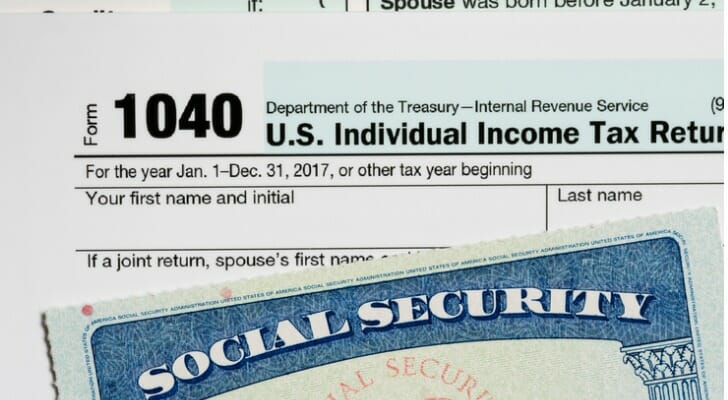Social Security benefits can provide an additional income stream in retirement alongside withdrawals from a 401(k), individual retirement account or brokerage account. Part of shaping a retirement plan around Social Security income means planning ahead for taxes. Social Security benefits are considered taxable for some retirees, though whether yours are can depend on your income. If you’re wondering, how you can avoid paying taxes on Social Security, there are some strategies you can try.
Do you have questions about your overall tax situation? Speak with a financial advisor today.
When Are Social Security Benefits Taxable?
Generally, Social Security benefits are only taxable when your income reaches certain thresholds. Those thresholds vary, based on your tax filing status. The amount of your benefits that are taxable depends on both. For Social Security to be tax-free, your annual combined income must be:
- Below $25,000 if you’re a single filer
- Below $32,000 if you’re married and file a joint tax return
The Social Security Administration considers combined income to be the total of your adjusted gross income, not counting Social Security income, tax-exempt interest and 50% of your Social Security income.
If your income is above the threshold specified for your filing status, there’s a second test that determines how much taxes you’ll pay on Social Security benefits. Specifically, you may be subject to one of two tax rates:
- Up to 50% of your benefit is taxable if you’re a single filer with a combined income between $25,000 and $34,000
- Up to 85% of your benefit is taxable if you’re a single filer with a combined income above $34,000
- Up to 50% of your benefit is taxable if you’re married filing jointly with a combined income between $32,000 and $44,000
- Up to 85% of your benefit is taxable if you’re married filing jointly with a combined income above $44,000
It’s worth noting that if you’re married but file separate returns, the Social Security Administration says you’ll most likely pay taxes on your benefits.
How Can I Avoid Paying Taxes on Social Security Benefits?

If you believe your income will put you over the threshold and require you to pay taxes on Social Security benefits, there are a few things you can do to potentially minimize what you owe. You may only have to worry about this, however, if your adjusted gross income would put you over the limit. Remember that for tax purposes, adjusted gross income (AGI), which is your gross income that accounts for certain deductions (which usually make it lower than your gross income), includes:
- Wages earned from a job
- Self-employment earnings
- Interest earnings
- Dividends
- Required minimum distributions (RMDs) from qualified retirement accounts, such as a 401(k) or traditional IRA
If you have any types of taxable income that would affect your AGI calculation, the first thing you could try and avoid taxes on Social Security is to contribute to tax-advantaged accounts. Specifically, that includes Roth accounts.
Roth IRAs and Roth 401(k) accounts allow for 100% tax-free distributions in retirement. A Roth IRA is also exempt from required minimum distributions starting at age 72. Withdrawals made in retirement from a Roth IRA wouldn’t affect your AGI calculations when determining which part of your Social Security benefits, if any, are taxable. If you already have a traditional 401(k) at work, you could use a Roth IRA to help offset some of your tax liability in retirement.
You could also consider a Roth IRA conversion if your assets are currently held in a traditional IRA. This allows you to essentially swap your current IRA for a Roth version, allowing you to tap into the benefit of tax-free withdrawals in retirement. But there’s a catch. You’ll owe income tax on any amounts you convert at the time the conversion happens.
Another option for minimizing Social Security taxes is to draw down taxable income as much as possible before taking benefits. Remember, the earliest age at which you can begin taking Social Security is 62. But if you have a 401(k) or IRA, you can begin taking money from those accounts without facing a tax penalty starting at age 59.5.
If you have money in a traditional 401(k) or traditional IRA, you may consider taking money out of those accounts before taking Social Security benefits. That way, you can pay the tax on those amounts and they won’t be factored in for AGI calculations since you’ll have already withdrawn them. You could then put the money into a taxable brokerage account so it can continue to be invested and grow over time.
While RMDs are unavoidable, barring a steep tax penalty, you can take steps to minimize what counts as income. For example, you can withdraw up to $100,000 from a traditional IRA and donate it to charity, with the withdrawn amount counting toward your RMD for the year.
You may also be able to defer RMDs and thus avoid paying tax on Social Security benefits using a qualified longevity annuity contract or QLAC. You can put up to $135,000 in IRA funds into a QLAC and defer taking required minimum distributions up to age 85. At the same time, the QLAC could make income payments back to you, though that can have its own tax implications.
Should You Avoid Paying Taxes on Social Security Benefits?
You might be focused on how to avoid paying taxes on Social Security but it’s important to consider whether you should.
For example, say your initial goal is to begin taking benefits at age 62 while continuing to work part-time. Doing so would mean having to keep a close eye on your income from part-time work to ensure that you don’t tip the threshold for having your benefits taxed. You’d also have to observe the annual earnings limits to avoid having your benefit amount reduced.
It’s worth noting also that taking Social Security prior to reaching your full retirement age would reduce your benefit amount. So, by working and receiving benefits early, you could effectively ding yourself financially three times over through benefit reductions and having to pay taxes on them.
When determining ways to avoid paying taxes on Social Security, it’s important to consider the bigger tax picture. That includes where withdrawals from both tax-advantaged retirement accounts and taxable brokerage accounts fit in. It’s also important to consider your timing when taking benefits. If you’re able to delay Social Security to age 70, for example, you could get 132% of your benefit amount.
Moving money from a taxable account, such as an IRA, to a brokerage account can also trigger problems. While your money can still be invested and grow, you’ll now be subject to capital gains tax on any profits you realize when selling investments. You could use tax-loss harvesting to offset gains with losses you may not escape taxes entirely. Talking to a financial advisor and/or a tax planning professional can help you decide which route to take as you approach Social Security benefits.
Bottom Line

Social Security benefits are taxable for some, though not all, retirees. If you anticipate having to pay taxes on your benefits in retirement, the time to start planning for that eventuality is now. Just keep in mind that there are some reasons why you may not want to avoid paying taxes on Social Security benefits. By taking proactive measures to mold your financial plan, you can minimize your overall tax liability.
Tips on Taxes
- Consider talking to a financial advisor about where Social Security benefits fit into your retirement income plan. Finding a financial advisor doesn’t have to be hard. SmartAsset’s free tool matches you with up to three vetted financial advisors who serve your area, and you can interview your advisor matches at no cost to decide which one is right for you. If you’re ready to find an advisor who can help you achieve your financial goals, get started now.
- If you’re not retired or receiving benefits yet, you can use a Social Security calculator to estimate how much you might be eligible for. You could then use that number to create a plan for managing taxes on Social Security benefits.
Photo credit: ©iStock.com/BackyardProduction, ©iStock.com/Kriangsak Koopattanakij, ©iStock.com/Jorge Villalba
